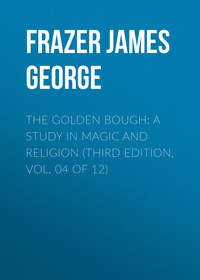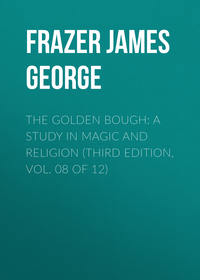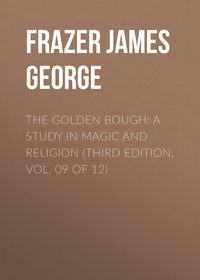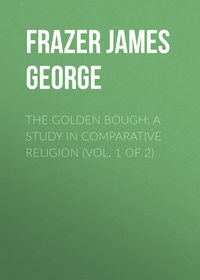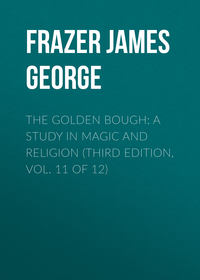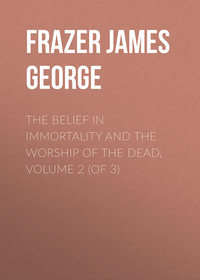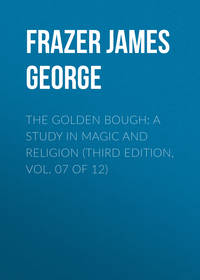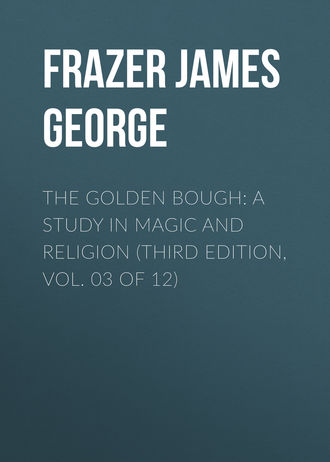 полная версия
полная версияThe Golden Bough: A Study in Magic and Religion (Third Edition, Vol. 03 of 12)
§ 4. Names of Kings and other Sacred Persons tabooed
The birth-names of kings kept secret or not pronounced.
When we see that in primitive society the names of mere commoners, whether alive or dead, are matters of such anxious care, we need not be surprised that great precautions should be taken to guard from harm the names of sacred kings and priests. Thus the name of the king of Dahomey is always kept secret, lest the knowledge of it should enable some evil-minded person to do him a mischief. The appellations by which the different kings of Dahomey have been known to Europeans are not their true names, but mere titles, or what the natives call “strong names” (nyi-sese). As a rule, these “strong names” are the first words of sentences descriptive of certain qualities. Thus Agaja, the name by which the fourth king of the dynasty was known, was part of a sentence meaning, “A spreading tree must be lopped before it can be cast into the fire”; and Tegbwesun, the name of the fifth king, formed the first word of a sentence which signified, “No one can take the cloth off the neck of a wild bull.” The natives seem to think that no harm comes of such titles being known, since they are not, like the birth-names, vitally connected with their owners.1405 In the Galla kingdom of Ghera the birth-name of the sovereign may not be pronounced by a subject under pain of death, and common words which resemble it in sound are changed for others. Thus when a queen named Carre reigned over the kingdom, the word hara, which means smoke, was exchanged for unno; further, arre, “ass,” was replaced by culula; and gudare, “potato,” was dropped and loccio substituted for it.1406 Among the Bahima of central Africa, when the king dies, his name is abolished from the language, and if his name was that of an animal, a new appellation must be found for the creature at once. For example, the king is often called a lion; hence at the death of a king named Lion a new name for lions in general has to be coined.1407 Thus in the language of the Bahima the word for “lion” some years ago was mpologoma. But when a prominent chief of that name died, the word for lion was changed to kichunchu. Again, in the Bahima language the word for “nine” used to be mwenda, a word which occurs with the same meaning but dialectical variations in the languages of other tribes of central and eastern Africa. But when a chief who bore the name Mwenda died, the old name for “nine” had to be changed, and accordingly the word isaga has been substituted for it.1408 In Siam it used to be difficult to ascertain the king's real name, since it was carefully kept secret from fear of sorcery; any one who mentioned it was clapped into gaol. The king might only be referred to under certain high-sounding titles, such as “the august,” “the perfect,” “the supreme,” “the great emperor,” “descendant of the angels,” and so on.1409 In Burma it was accounted an impiety of the deepest dye to mention the name of the reigning sovereign; Burmese subjects, even when they were far from their country, could not be prevailed upon to do so;1410 after his accession to the throne the king was known by his royal titles only.1411 The proper name of the Emperor of China may neither be pronounced nor written by any of his subjects.1412 Coreans were formerly forbidden, under severe penalties, to utter the king's name, which, indeed, was seldom known.1413 When a prince ascends the throne of Cambodia he ceases to be designated by his real name; and if that name happens to be a common word in the language, the word is often changed. Thus, for example, since the reign of King Ang Duong the word duong, which meant a small coin, has been replaced by dom.1414 In the island of Sunda it is taboo to utter any word which coincides with the name of a prince or chief.1415 The name of the rajah of Bolang Mongondo, a district in the west of Celebes, is never mentioned except in case of urgent necessity, and even then his pardon must be asked repeatedly before the liberty is taken.1416 In the island of Sumba people do not mention the real name of a prince, but refer to him by the name of the first slave whom in his youth he became master of. This slave is regarded by the chief as his second self, and he enjoys practical impunity for any misdeeds he may commit.1417
The names of Zulu kings and chiefs may not be pronounced.
Among the Zulus no man will mention the name of the chief of his tribe or the names of the progenitors of the chief, so far as he can remember them; nor will he utter common words which coincide with or merely resemble in sound tabooed names. “As, for instance, the Zungu tribe say mata for manzi (water), and inkosta for tshanti (grass), and embigatdu for umkondo (assegai), and inyatugo for enhlela (path), because their present chief is Umfan-o inhlela, his father was Manzini, his grandfather Imkondo, and one before him Tshani.” In the tribe of the Dwandwes there was a chief called Langa, which means the sun; hence the name of the sun was changed from langa to gala, and so remains to this day, though Langa died more than a hundred years ago. Once more, in the Xnumayo tribe the word meaning “to herd cattle” was changed from alusa or ayusa to kagesa, because u-Mayusi was the name of the chief. Besides these taboos, which were observed by each tribe separately, all the Zulu tribes united in tabooing the name of the king who reigned over the whole nation. Hence, for example, when Panda was king of Zululand, the word for “a root of a tree,” which is impando, was changed to nxabo. Again, the word for “lies” or “slander” was altered from amacebo to amakwata, because amacebo contains a syllable of the name of the famous King Cetchwayo. These substitutions are not, however, carried so far by the men as by the women, who omit every sound even remotely resembling one that occurs in a tabooed name. At the king's kraal, indeed, it is sometimes difficult to understand the speech of the royal wives, as they treat in this fashion the names not only of the king and his forefathers, but even of his and their brothers back for generations. When to these tribal and national taboos we add those family taboos on the names of connexions by marriage which have been already described,1418 we can easily understand how it comes about that in Zululand every tribe has words peculiar to itself, and that the women have a considerable vocabulary of their own. Members, too, of one family may be debarred from using words employed by those of another. The women of one kraal, for instance, may call a hyaena by its ordinary name; those of the next may use the common substitute; while in a third the substitute may also be unlawful and another term may have to be invented to supply its place. Hence the Zulu language at the present day almost presents the appearance of being a double one; indeed, for multitudes of things it possesses three or four synonyms, which through the blending of tribes are known all over Zululand.1419
The names of living kings and chiefs may not be pronounced in Madagascar.
In Madagascar a similar custom everywhere prevails and has resulted, as among the Zulus, in producing certain dialectic differences in the speech of the various tribes. There are no family names in Madagascar, and almost every personal name is drawn from the language of daily life and signifies some common object or action or quality, such as a bird, a beast, a tree, a plant, a colour, and so on. Now, whenever one of these common words forms the name or part of the name of the chief of the tribe, it becomes sacred and may no longer be used in its ordinary signification as the name of a tree, an insect, or what not. Hence a new name for the object must be invented to replace the one which has been discarded. Often the new name consists of a descriptive epithet or a periphrasis. Thus when the princess Rabodo became queen in 1863 she took the name of Rasoherina. Now soherina was the word for the silkworm moth, but having been assumed as the name of the sovereign it could no longer be applied to the insect, which ever since has been called zany-dandy, “offspring of silk.” So, again, if a chief had or took the name of an animal, say of the dog (amboa), and was known as Ramboa, the animal would henceforth be called by another name, probably a descriptive one, such as “the barker” (famovo) or “the driver away” (fandroaka), etc. In the western part of Imerina there was a chief called Andria-mamba; but mamba was one of the names of the crocodile, so the chiefs subjects might not call the reptile by that name and were always scrupulous to use another. It is easy to conceive what confusion and uncertainty may thus be introduced into a language when it is spoken by many little local tribes each ruled by a petty chief with his own sacred name. Yet there are tribes and people who submit to this tyranny of words as their fathers did before them from time immemorial. The inconvenient results of the custom are especially marked on the western coast of the island, where, on account of the large number of independent chieftains, the names of things, places, and rivers have suffered so many changes that confusion often arises, for when once common words have been banned by the chiefs the natives will not acknowledge to have ever known them in their old sense.1420
The names of dead kings and chiefs are also tabooed in Madagascar.
But it is not merely the names of living kings and chiefs which are tabooed in Madagascar; the names of dead sovereigns are equally under a ban, at least in some parts of the island. Thus among the Sakalavas, when a king has died, the nobles and people meet in council round the dead body and solemnly choose a new name by which the deceased monarch shall be henceforth known. The new name always begins with andrian, “lord,” and ends with arrivou, “thousand,” to signify that the late king ruled over a numerous nation. The body of the name is composed of an epithet or phrase descriptive of the deceased or of his reign. After the new name has been adopted, the old name by which the king was known during his life becomes sacred and may not be pronounced under pain of death. Further, words in the common language which bear any resemblance to the forbidden name also become sacred and have to be replaced by others. For example, after the death of King Makka the word laka, which meant a canoe, was abandoned and the word fiounrâma substituted for it. When Taoussi died, the word taoussi, signifying “beautiful,” was replaced by senga. For similar reasons the word ântétsi, “old,” was changed for matoué, which properly means “ripe”; the word voûssi, “castrated,” was dropped and manapaka, “cut,” adopted in its place; and the word for island (nossi) was changed into varioû, which signifies strictly “a place where there is rice.” Again, when a Sakalava king named Marentoetsa died, two words fell into disuse, namely, the word màry or màre meaning “true,” and the word toetsa meaning “condition.” Persons who uttered these forbidden words were looked on not only as grossly rude, but even as felons; they had committed a capital crime. However, these changes of vocabulary are confined to the district over which the deceased king reigned; in the neighbouring districts the old words continue to be employed in the old sense.1421 Again, among the Bara, another tribe of Madagascar, “the memory of their deceased kings is held in the very highest respect; the name of such kings is considered sacred – too sacred indeed for utterance, and no one is allowed to pronounce it. To such a length is this absurdity carried that the name of any person or thing whatsoever, if it bear a resemblance to the name of the deceased king, is no longer used, but some other designation is given. For instance, there was a king named Andriamasoandro. After his decease the word masoandro was no longer employed as the name of the sun, but mahenika was substituted for it.”1422 An eminent authority on Madagascar has observed: “A curious fact, which has had a very marked influence on the Malagasy language, is the custom of no longer pronouncing the name of a dead person nor even the words which resemble it in their conclusions. The name is replaced by another. King Ramitra, since his decease, has been called Mahatenatenarivou, 'the prince who has conquered a thousand foes,' and a Malagasy who should utter his old name would be regarded as the murderer of the prince, and would therefore be liable to the confiscation of his property, or even to the penalty of death. It is easy accordingly to understand how the Malagasy language, one in its origin, has been corrupted, and how it comes about that at the present day there are discrepancies between the various dialects. In Menabe, since the death of King Vinany, the word vilany, meaning a pot, has been replaced by fiketrehane, ‘cooking vessel,’ whereas the old word continues in use in the rest of Madagascar. These changes, it is true, hardly take place except for kings and great chiefs.”1423
The names of chiefs may not be pronounced in Polynesia.
The sanctity attributed to the persons of chiefs in Polynesia naturally extended also to their names, which on the primitive view are hardly separable from the personality of their owners. Hence in Polynesia we find the same systematic prohibition to utter the names of chiefs or of common words resembling them which we have already met with in Zululand and Madagascar. Thus in New Zealand the name of a chief is held so sacred that, when it happens to be a common word, it may not be used in the language, and another has to be found to replace it. For example, a chief to the southward of East Cape bore the name of Maripi, which signified a knife, hence a new word (nekra) for knife was introduced, and the old one became obsolete. Elsewhere the word for water (wai) had to be changed, because it chanced to be the name of the chief, and would have been desecrated by being applied to the vulgar fluid as well as to his sacred person. This taboo naturally produced a plentiful crop of synonyms in the Maori language, and travellers newly arrived in the country were sometimes puzzled at finding the same things called by quite different names in neighbouring tribes.1424 When a king comes to the throne in Tahiti, any words in the language that resemble his name in sound must be changed for others. In former times, if any man were so rash as to disregard this custom and to use the forbidden words, not only he but all his relations were immediately put to death.1425 On the accession of King Otoo, which happened before Vancouver's visit to Tahiti, the proper names of all the chiefs were changed, as well as forty or fifty of the commonest words in the language, and every native was obliged to adopt the new terms, for any neglect to do so was punished with the greatest severity.1426 When a certain king named Tu came to the throne of Tahiti the word tu, which means “to stand,” was changed to tia; fetu, “a star,” became fetia; tui, “to strike,” was turned into tiai, and so on. Sometimes, as in these instances, the new names were formed by merely changing or dropping some letter or letters of the original words; in other cases the substituted terms were entirely different words, whether chosen for their similarity of meaning though not of sound, or adopted from another dialect, or arbitrarily invented. But the changes thus introduced were only temporary; on the death of the king the new words fell into disuse, and the original ones were revived.1427 Similarly in Samoa, when the name of a sacred chief was that of an animal or bird, the name of the animal or bird was at once changed for another, and the old one might never again be uttered in that chief's district. For example, a sacred Samoan chief was named Pe'a, which means “flying-fox.” Hence in his district a flying-fox was no longer called a flying-fox but a “bird of heaven” (manu langi).1428
The names of the Eleusinian priests might not be uttered.
In ancient Greece the names of the priests and other high officials who had to do with the performances of the Eleusinian mysteries might not be uttered in their lifetime. To pronounce them was a legal offence. The pedant in Lucian tells how he fell in with these august personages hailing along to the police court a ribald fellow who had dared to name them, though well he knew that ever since their consecration it was unlawful to do so, because they had become anonymous, having lost their old names and acquired new and sacred titles.1429 From two inscriptions found at Eleusis it appears that the names of the priests were committed to the depths of the sea;1430 probably they were engraved on tablets of bronze or lead, which were then thrown into deep water in the Gulf of Salamis. The intention doubtless was to keep the names a profound secret; and how could that be done more surely than by sinking them in the sea? what human vision could spy them glimmering far down in the dim depths of the green water? A clearer illustration of the confusion between the incorporeal and the corporeal, between the name and its material embodiment, could hardly be found than in this practice of civilised Greece.
The old names of members of the Yewe order in Togo may not be uttered.
In Togo, a district of West Africa, a secret religious society flourishes under the name of the Yewe order. Both men and women are admitted to it. The teaching and practice of the order are lewd and licentious. Murderers and debtors join it for the sake of escaping from justice, for the members are not amenable to the laws. On being initiated every one receives a new name, and thenceforth his or her old name may never be mentioned by anybody under penalty of a heavy fine. Should the old name be uttered in a quarrel by an uninitiated person, the aggrieved party, who seems to be oftener a woman than a man, pretends to fall into a frenzy, and in this state rushes into the house of the offender, smashes his pots, destroys the grass roof, and tears down the fence. Then she runs away into the forest, where the simple people believe that she is changed into a leopard. In truth she slinks by night into the conventual buildings of the order, and is there secretly kept in comfort till the business is settled. At last she is publicly brought back by the society with great pomp, her body smeared with red earth and adorned with an artificial tail in order to make the ignorant think that she has really been turned into a leopard.1431
The utterance of the names of gods and spirits is supposed to disturb the course of nature.
When the name is held to be a vital part of the person, it is natural to suppose that the mightier the person the more potent must be his name. Hence the names of supernatural beings, such as gods and spirits, are commonly believed to be endowed with marvellous virtues, and the mere utterance of them may work wonders and disturb the course of nature. The Warramunga of central Australia believe in a formidable but mythical snake called the Wollunqua, which lives in a pool. When they speak of it amongst themselves they designate it by another name, because they say that, were they to call the snake too often by its real name, they would lose control over the creature, and it would come out of the water and eat them all up.1432 For this reason, too, the sacred books of the Mongols, which narrate the miraculous deeds of the divinities, are allowed to be read only in spring or summer; because at other seasons the reading of them would bring on tempests or snow.1433 When Mr. Campbell was travelling with some Bechuanas, he asked them one morning after breakfast to tell him some of their stories, but they informed him that were they to do so before sunset, the clouds would fall from the heavens upon their heads.1434 The Sulka of New Britain believe in a certain hostile spirit named Kot, to whose wrath they attribute earthquakes, thunder, and lightning. Among the things which provoke his vengeance is the telling of tales and legends by day; stories should be told only at evening or night.1435 Most of the rites of the Navajo Indians may be celebrated only in winter, when the thunder is silent and the rattlesnakes are hibernating. Were they to tell of their chief gods or narrate the myths of the days of old at any other time, the Indians believe that they would soon be killed by lightning or snake-bites. When Dr. Washington Matthews was in New Mexico, he often employed as his guide and informant a liberal-minded member of the tribe who had lived with Americans and Mexicans and seemed to be free from the superstitions of his fellows. “On one occasion,” says Dr. Matthews, “during the month of August, in the height of the rainy season, I had him in my study conversing with him. In an unguarded moment, on his part, I led him into a discussion about the gods of his people, and neither of us had noticed a heavy storm coming over the crest of the Zuñi mountains, close by. We were just talking of Estsanatlehi, the goddess of the west, when the house was shaken by a terrific peal of thunder. He rose at once, pale and evidently agitated, and, whispering hoarsely, ‘Wait till Christmas; they are angry,’ he hurried away. I have seen many such evidences of the deep influence of this superstition on them.”1436 Among the Iroquois the rehearsal of tales of wonder formed the chief entertainment at the fireside in winter. But all the summer long, from the time when the trees began to bud in spring till the red leaves of autumn began to fall, these marvellous stories were hushed and historical traditions took their place.1437 Other Indian tribes also will only tell their mythic tales in winter, when the snow lies like a pall on the ground, and lakes and rivers are covered with sheets of ice; for then the spirits underground cannot hear the stories in which their names are made free with by merry groups gathered round the fire.1438 The Yabims of German New Guinea tell their magical tales especially at the time when the yams have been gathered and are stored in the houses. Such tales are told at evening by the light of the fire to a circle of eager listeners, the narrative being broken from time to time with a song in which the hearers join. The telling of these stories is believed to promote the growth of the crops. Hence each tale ends with a wish that there may be many yams, that the taro may be big, the sugar-cane thick, and the bananas long.1439
Winter and summer names of the Kwakiutl Indians.
Among the Kwakiutl Indians of British Columbia the superstition about names has affected in a very curious way the social structure of the tribe. The nobles have two different sets of names, one for use in winter and the other in summer. Their winter names are those which were given them at initiation by their guardian spirits, and as these spirits appear to their devotees only in winter, the names which they bestowed on the Indians may not be pronounced in summer. Conversely the summer names may not be used in winter. The change from summer to winter names takes place from the moment when the spirits are supposed to be present, and it involves a complete transformation of the social system; for whereas during summer the people are grouped in clans, in winter they are grouped in societies, each society consisting of all persons who have been initiated by the same spirit and have received from him the same magical powers. Thus among these Indians the fundamental constitution of society changes with the seasons: in summer it is organised on a basis of kin, in winter on a basis of spiritual affinity: for one half the year it is civil, for the other half religious.1440
§ 5. Names of Gods tabooed
Names of gods kept secret. How Isis discovered the name of Ra, the sun-god.
Primitive man creates his gods in his own image. Xenophanes remarked long ago that the complexion of negro gods was black and their noses flat; that Thracian gods were ruddy and blue-eyed; and that if horses, oxen, and lions only believed in gods and had hands wherewith to portray them, they would doubtless fashion their deities in the form of horses, and oxen, and lions.1441 Hence just as the furtive savage conceals his real name because he fears that sorcerers might make an evil use of it, so he fancies that his gods must likewise keep their true names secret, lest other gods or even men should learn the mystic sounds and thus be able to conjure with them. Nowhere was this crude conception of the secrecy and magical virtue of the divine name more firmly held or more fully developed than in ancient Egypt, where the superstitions of a dateless past were embalmed in the hearts of the people hardly less effectually than the bodies of cats and crocodiles and the rest of the divine menagerie in their rock-cut tombs. The conception is well illustrated by a story which tells how the subtle Isis wormed his secret name from Ra, the great Egyptian god of the sun. Isis, so runs the tale, was a woman mighty in words, and she was weary of the world of men, and yearned after the world of the gods. And she meditated in her heart, saying, “Cannot I by virtue of the great name of Ra make myself a goddess and reign like him in heaven and earth?” For Ra had many names, but the great name which gave him all power over gods and men was known to none but himself. Now the god was by this time grown old; he slobbered at the mouth and his spittle fell upon the ground. So Isis gathered up the spittle and the earth with it, and kneaded thereof a serpent and laid it in the path where the great god passed every day to his double kingdom after his heart's desire. And when he came forth according to his wont, attended by all his company of gods, the sacred serpent stung him, and the god opened his mouth and cried, and his cry went up to heaven. And the company of gods cried, “What aileth thee?” and the gods shouted, “Lo and behold!” But he could not answer; his jaws rattled, his limbs shook, the poison ran through his flesh as the Nile floweth over the land. When the great god had stilled his heart, he cried to his followers, “Come to me, O my children, offspring of my body. I am a prince, the son of a prince, the divine seed of a god. My father devised my name; my father and my mother gave me my name, and it remained hidden in my body since my birth, that no magician might have magic power over me. I went out to behold that which I have made, I walked in the two lands which I have created, and lo! something stung me. What it was, I know not. Was it fire? was it water? My heart is on fire, my flesh trembleth, all my limbs do quake. Bring me the children of the gods with healing words and understanding lips, whose power reacheth to heaven.” Then came to him the children of the gods, and they were very sorrowful. And Isis came with her craft, whose mouth is full of the breath of life, whose spells chase pain away, whose word maketh the dead to live. She said, “What is it, divine Father? what is it?” The holy god opened his mouth, he spake and said, “I went upon my way, I walked after my heart's desire in the two regions which I have made to behold that which I have created, and lo! a serpent that I saw not stung me. Is it fire? is it water? I am colder than water, I am hotter than fire, all my limbs sweat, I tremble, mine eye is not steadfast, I behold not the sky, the moisture bedeweth my face as in summer-time.” Then spake Isis, “Tell me thy name, divine Father, for the man shall live who is called by his name.” Then answered Ra, “I created the heavens and the earth, I ordered the mountains, I made the great and wide sea, I stretched out the two horizons like a curtain. I am he who openeth his eyes and it is light, and who shutteth them and it is dark. At his command the Nile riseth, but the gods know not his name. I am Khepera in the morning, I am Ra at noon, I am Tum at eve.” But the poison was not taken away from him; it pierced deeper, and the great god could no longer walk. Then said Isis to him, “That was not thy name that thou spakest unto me. Oh tell it me, that the poison may depart; for he shall live whose name is named.” Now the poison burned like fire, it was hotter than the flame of fire. The god said, “I consent that Isis shall search into me, and that my name shall pass from my breast into hers.” Then the god hid himself from the gods, and his place in the ship of eternity was empty. Thus was the name of the great god taken from him, and Isis, the witch, spake, “Flow away poison, depart from Ra. It is I, even I, who overcome the poison and cast it to the earth; for the name of the great god hath been taken away from him. Let Ra live and let the poison die.” Thus spake great Isis, the queen of the gods, she who knows Ra and his true name.1442


